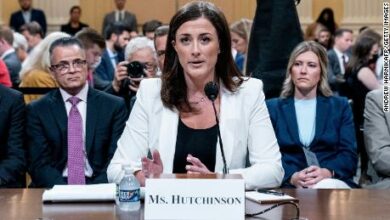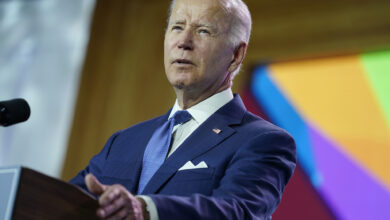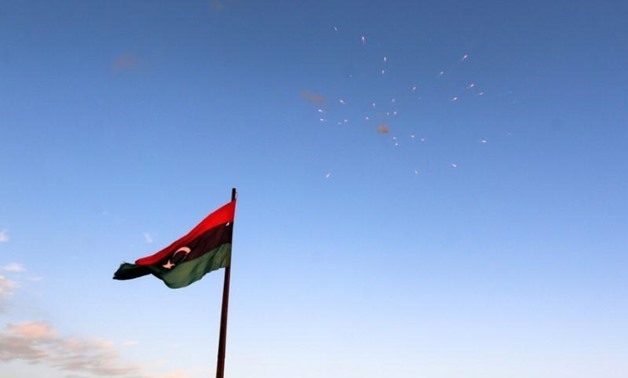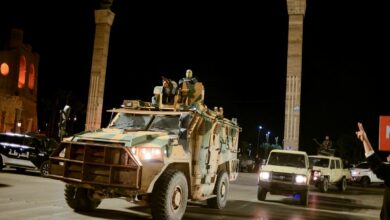With the clock ticking down to the referendum on constitutional amendments slated for Saturday, the pro-democracy movement remains divided on how to vote.
While some of the divisions concern legal issues pertaining to how the amendments are written, the referendum’s political implications are what worries voters most. Blogs and Facebook posts abundantly address the issue.
The main points of contention are the interim period that follows the voting, the instruments that guarantee its legitimacy, and the preservation of ideals espoused during Egypt’s 25 January Revolution.
People opposed to the referendum say that amending the Constitution fails to solve that document’s problems. “It is a [new] foundation that we are in dire need of building now, namely: a new constitution… that guarantees basic personal, political and human rights; real diversity of representation through freedom of association and speech; the rule of law; and meaningful limits and separation of powers,” said Marwa Sharafeldin, an activist who argued against the amendments during the Doha Debates on Monday.
Proponents of the “no” vote demand the drafting of a new constitution. For them, an ideal scenario is that power be handed, by a temporary constitutional declaration, over from the military to a presidential council or an elected interim president until the time that a new constitution is put in place.
But those who intend to vote for the amendments are fearful that without the proposed changes, a handover to a civilian entity, be it a presidential council or an elected interim president, would occur under military guardianship. The latter has been condemned by human rights activists for arbitrary arrests, torture and military trial of civilians falsely accused sometimes of being thugs.
“There are people, like me, who don’t trust the military at all, as it has been slow in responding to [our] demands,” wrote Alaa Seif on his blog. Seif is a leftist activist who intends to vote in favor of the amendments. “The military has been preserving the security of the state, protecting symbols of the [toppled ruling] National Democratic Party and corrupt people, while consistently fighting protests and strikes,” he wrote.
Amr Abdel Rahman, a political analyst, believes that the military has no way out of political decision-making. He traces two strains in the army, one institutional and the other oligarchic. Both, he says, are not conducive to military rule. The institutional strain took the lead recently when preserving the nation from state failure. However, the military’s unique powers in this regard were carefully deployed.
“The military is wary of its sensitive position as the [state’s] only strong institution… [It] cannot indulge itself in political fancies that would threaten its strength in the future,” Abdel Rahman wrote in an online post. Fearing its own politicization, the military refuses to institute sweeping changes and strives to hand over power to a civilian regime as soon as possible.
For Abdel Rahman, the oligarchic strain of the military is what prompts its fierce fight against protests in an effort to prevent economic disruptions. This represents another reason why the military’s departure from political leadership is urgent.
For voters in favor of the amendments, they believe strongly in the necessity of the amendment to article 189, which stipulates that the elected parliament forms a committee to draft a new constitution within 60 days. For them, the amendments offer a clear timetable for the transition.
Seif stresses the urgency of legislative authority. “Currently, we don’t have a legislative authority at a time when we have an urgent need for legislation on important reforms that directly relate to the revolution. It is neither practical nor acceptable that the military or a non-elected interim leadership issue such legislation,” he said.
But for the naysayers, a constitution produced by the next elected parliament will be tainted by those most likely to win seats, namely the Muslim Brotherhood and remnants of the NDP. The Brotherhood and the NDP are widely perceived as the most likely groups to benefit from hasty parliamentary elections because they remain more organized than the nascent political forces which led the revolution.
Seif dismisses what he calls a scarecrow mentality deployed by the toppled regime. “The NDP used some voters, forged lists full of dead people, repeated some names, excluded others, in addition to thuggery, police brutality, vote-buying and vote prevention. This was all amid low voter participation and absence of supervision…,” he said. In other words, the state institution that the NDP employed to win a parliament majority is no longer in its grip.
And for Abdel Rahman, it’s unlikely that the Muslim Brotherhood will exploit the situation by dominating parliament. “The Muslim Brotherhood cannot risk imposing its hegemony amid such a hype of polarization and reservation against it…. It seems that the Brotherhood has a real vested interest in protecting itself within a wide democratic coalition,” he said.
Yet, what the amendments’ proponents endorse is based on a previous pledge by the military to hold parliamentary and presidential elections in June and August respectively. However, a 12 March statement by Mamdouh Shahin, vice minister of defense for legal issues, showed that the military would not be ready to hold parliamentary elections before September and presidential elections before December. Some analysts worry that the logistical aspect of organizing the voting, which entails revamping electoral lists and rehabilitating the security apparatus among other things, is an enormous job which will require the military remaining to preserve stability in the interim.
Past those divergences, pro-democracy groups are already considering the next steps they should take irrespective of the referendum’s outcome. Many hailed the conversation around the proposed amendments as yet another exercise in political engagement ahead of the polling, an event traditionally characterized by voter apathy in the past.




